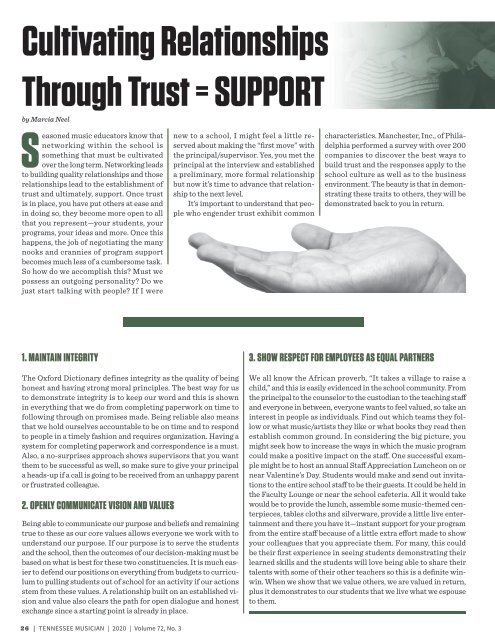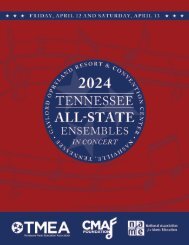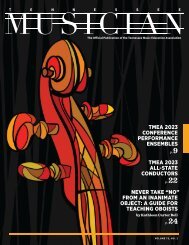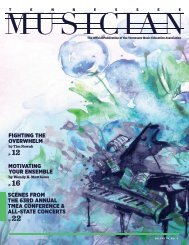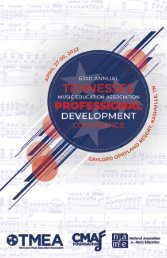TN Musician Vol. 72, No. 3
You also want an ePaper? Increase the reach of your titles
YUMPU automatically turns print PDFs into web optimized ePapers that Google loves.
Cultivating Relationships<br />
Through Trust = SUPPORT<br />
by Marcia Neel<br />
Seasoned music educators know that<br />
networking within the school is<br />
something that must be cultivated<br />
over the long term. Networking leads<br />
to building quality relationships and those<br />
relationships lead to the establishment of<br />
trust and ultimately, support. Once trust<br />
is in place, you have put others at ease and<br />
in doing so, they become more open to all<br />
that you represent—your students, your<br />
programs, your ideas and more. Once this<br />
happens, the job of negotiating the many<br />
nooks and crannies of program support<br />
becomes much less of a cumbersome task.<br />
So how do we accomplish this? Must we<br />
possess an outgoing personality? Do we<br />
just start talking with people? If I were<br />
new to a school, I might feel a little reserved<br />
about making the “first move” with<br />
the principal/supervisor. Yes, you met the<br />
principal at the interview and established<br />
a preliminary, more formal relationship<br />
but now it’s time to advance that relationship<br />
to the next level.<br />
It’s important to understand that people<br />
who engender trust exhibit common<br />
characteristics. Manchester, Inc., of Philadelphia<br />
performed a survey with over 200<br />
companies to discover the best ways to<br />
build trust and the responses apply to the<br />
school culture as well as to the business<br />
environment. The beauty is that in demonstrating<br />
these traits to others, they will be<br />
demonstrated back to you in return.<br />
1. MAINTAIN INTEGRITY<br />
The Oxford Dictionary defines integrity as the quality of being<br />
honest and having strong moral principles. The best way for us<br />
to demonstrate integrity is to keep our word and this is shown<br />
in everything that we do from completing paperwork on time to<br />
following through on promises made. Being reliable also means<br />
that we hold ourselves accountable to be on time and to respond<br />
to people in a timely fashion and requires organization. Having a<br />
system for completing paperwork and correspondence is a must.<br />
Also, a no-surprises approach shows supervisors that you want<br />
them to be successful as well, so make sure to give your principal<br />
a heads-up if a call is going to be received from an unhappy parent<br />
or frustrated colleague.<br />
2. OPENLY COMMUNICATE VISION AND VALUES<br />
Being able to communicate our purpose and beliefs and remaining<br />
true to these as our core values allows everyone we work with to<br />
understand our purpose. If our purpose is to serve the students<br />
and the school, then the outcomes of our decision-making must be<br />
based on what is best for these two constituencies. It is much easier<br />
to defend our positions on everything from budgets to curriculum<br />
to pulling students out of school for an activity if our actions<br />
stem from these values. A relationship built on an established vision<br />
and value also clears the path for open dialogue and honest<br />
exchange since a starting point is already in place.<br />
3. SHOW RESPECT FOR EMPLOYEES AS EQUAL PAR<strong>TN</strong>ERS<br />
We all know the African proverb, “It takes a village to raise a<br />
child,” and this is easily evidenced in the school community. From<br />
the principal to the counselor to the custodian to the teaching staff<br />
and everyone in between, everyone wants to feel valued, so take an<br />
interest in people as individuals. Find out which teams they follow<br />
or what music/artists they like or what books they read then<br />
establish common ground. In considering the big picture, you<br />
might seek how to increase the ways in which the music program<br />
could make a positive impact on the staff. One successful example<br />
might be to host an annual Staff Appreciation Luncheon on or<br />
near Valentine’s Day. Students would make and send out invitations<br />
to the entire school staff to be their guests. It could be held in<br />
the Faculty Lounge or near the school cafeteria. All it would take<br />
would be to provide the lunch, assemble some music-themed centerpieces,<br />
tables cloths and silverware, provide a little live entertainment<br />
and there you have it—instant support for your program<br />
from the entire staff because of a little extra effort made to show<br />
your colleagues that you appreciate them. For many, this could<br />
be their first experience in seeing students demonstrating their<br />
learned skills and the students will love being able to share their<br />
talents with some of their other teachers so this is a definite winwin.<br />
When we show that we value others, we are valued in return,<br />
plus it demonstrates to our students that we live what we espouse<br />
to them.<br />
26 | TENNESSEE MUSICIAN | 2020 | <strong>Vol</strong>ume <strong>72</strong>, <strong>No</strong>. 3


